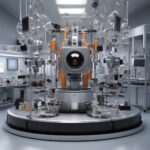UK’s New £225 Million Supercomputer Set to Revolutionize Medicine
In Bristol, a groundbreaking development in the field of medicine is taking place that could potentially change the way we approach healthcare. A state-of-the-art £225 million supercomputer is being deployed with the aim of leveraging artificial intelligence to revolutionize the development of vaccines and treatments for complex diseases such as Alzheimer’s and cancer.
The significance of this innovation cannot be overstated. With the power of artificial intelligence, researchers and healthcare professionals will be able to analyze vast amounts of data at speeds and scales previously unimaginable. This supercomputer will have the capability to process complex algorithms and simulations, enabling scientists to gain valuable insights into the underlying mechanisms of diseases and accelerate the discovery of effective treatments.
One of the key areas where this supercomputer is expected to make a significant impact is in the field of vaccine development. Traditional vaccine development can be a time-consuming and laborious process, often taking years to bring a new vaccine to market. By harnessing the power of artificial intelligence, researchers can expedite the vaccine development process by quickly identifying potential candidates and predicting their efficacy, ultimately leading to faster deployment and greater efficacy in combating infectious diseases.
Moreover, the supercomputer’s application in developing treatments for complex diseases like Alzheimer’s and cancer holds immense promise. These diseases present unique challenges due to their multifaceted nature and the lack of effective treatment options. With the supercomputer’s ability to analyze vast datasets and simulate various scenarios, researchers can gain a deeper understanding of the underlying mechanisms of these diseases and identify novel therapeutic targets that were previously overlooked.
Furthermore, the supercomputer will enable personalized medicine approaches by analyzing individual patient data to tailor treatments based on specific genetic and molecular profiles. This precision medicine approach has the potential to revolutionize patient care by ensuring that treatments are more effective, with fewer side effects, leading to better outcomes for patients.
The implications of this technological advancement extend far beyond the realm of medicine. The UK’s investment in supercomputing capabilities not only positions the country as a leader in healthcare innovation but also has far-reaching economic benefits. By fostering a conducive environment for research and development, the UK can attract top talent and drive growth in the life sciences sector, ultimately contributing to the country’s economic prosperity.
As we stand on the cusp of this new era in healthcare innovation, it is essential to recognize the transformative potential of supercomputing and artificial intelligence in advancing medical research and improving patient outcomes. The UK’s new supercomputer represents a significant milestone in this journey towards revolutionizing medicine and underscores the importance of investing in cutting-edge technologies to address the most pressing healthcare challenges of our time.
In conclusion, the deployment of the £225 million supercomputer in Bristol marks a pivotal moment in the field of medicine, offering unprecedented opportunities to accelerate the development of vaccines and treatments for complex diseases. By harnessing the power of artificial intelligence, researchers can unlock new insights into disease mechanisms and pave the way for personalized medicine approaches that have the potential to transform patient care. The UK’s investment in supercomputing capabilities not only positions the country at the forefront of healthcare innovation but also promises to drive economic growth and foster a culture of scientific excellence.
supercomputer, revolutionize, medicine, artificial intelligence, healthcare












